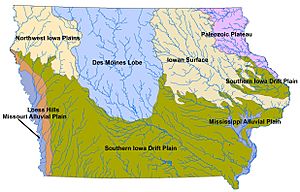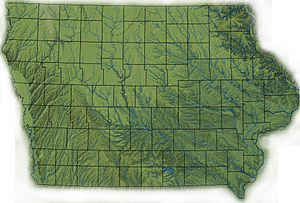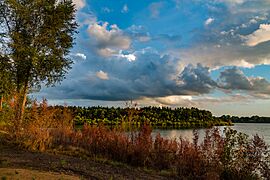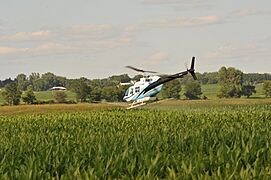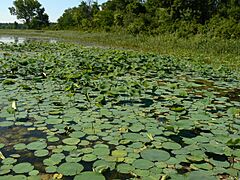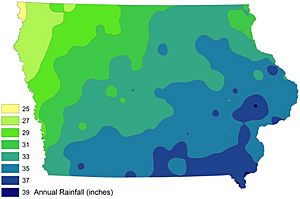Environment of Iowa facts for kids
The environment of Iowa has changed a lot because of farming since it became a U.S. state in 1846. But there are still many natural places in Iowa that show different kinds of habitats. These places are home to many plants and animals.
Contents
Iowa's Nature: Plants and Animals
Iowa's natural plant life used to be mostly tallgrass prairie (like a big grassy field) and savanna (grassland with scattered trees) on higher ground. In river valleys and wet areas, there were thick forests and wetlands. Northern prairie areas had small, wet spots called pothole wetlands.
Today, most of Iowa is used for farming. Crops cover about 60% of the state. Grasslands, including pastures and some remaining prairies and wetlands, cover 30%. Forests make up about 7%. Cities and water each cover about 1%.
Animals and Plants Long Ago
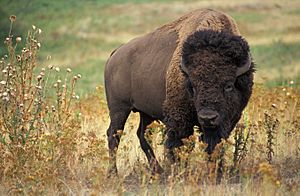
In 1840, a person named Isaac Galland wrote about many animals in Iowa. These included bison (buffalo), elk, and deer. There were also smaller animals like raccoons, fox squirrels, beavers, and muskrats.
Big predators like mountain lions, lynxes, wolves, and bears also lived here. Birds like turkeys, prairie chickens, swans, geese, and bald eagles were common. Even the passenger pigeon, which is now extinct, used to live here.
Galland also listed many edible plants. People could find strawberries, blackberries, raspberries, and gooseberries. There were also plums, crabapples, and different kinds of nuts like hickory nuts and black walnuts.
The first full list of Iowa's bird species was made in 1889 by Charles Rollin Keyes. It included 262 different kinds of birds. Herbert Osborne made the first full list of mammals in Iowa in 1890.
Iowa's Natural Areas
Iowa has very few natural areas left. Less than 1% of the original tallgrass prairie remains. Only about 5% of the state's prairie pothole wetlands are left. Most of the original forests have also disappeared. Iowa ranks very low (49th out of 50) among U.S. states for how much public land it has.
Animals and Plants in Danger
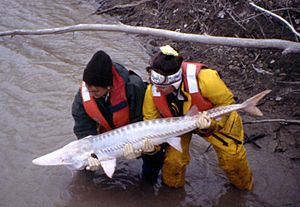
As of 2016, the United States Fish and Wildlife Service lists several species in Iowa as threatened or endangered.
Federally Endangered Animal Species: These animals are in serious danger of disappearing forever.
- Indiana bat (Myotis sodalis)
- Higgins eye pearly mussel (Lampsilis higginsii)
- Topeka shiner (Notropis topeka)
- Iowa Pleistocene snail (Discus macclintocki)
- Pallid sturgeon (Scaphirhynchus albus)
- Least interior tern (Sterna antillarum)
- Sheepnose Mussel (Plethobasus cyphyus)
- Spectaclecase (mussel) (Cumberlandia monodonta)
- Poweshiek Skipperling (Oarisma poweshiek)
Federally Threatened Animal Species: These animals are likely to become endangered in the near future.
- Piping plover (Charadrius melodus), except in the Great Lakes area
- Northern long-eared bat (Myotis septentrionalis)
- Dakota Skipper (Hesperia dacotae)
Animals No Longer Living in Iowa (Extirpated):
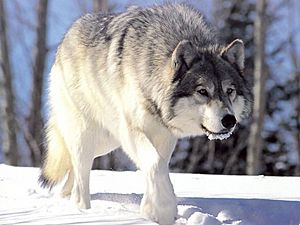
"Extirpated" means these animals no longer live in Iowa, but they still exist in other places.
- American burying beetle (Nicrophorus americanus)
- Winged mapleleaf mussel (Quadrula fragosa)
- Scaleshell mussel (Leptodea leptodon)
- Orange-footed pimpleback mussel (Plethobasus cooperianus)
- Fat pocketbook pearly mussel (Potamilus capax)
- Gray wolf (Canis lupus) - Wolves sometimes come into Iowa from Minnesota and Wisconsin.
Federally Threatened Plant Species: These plants are likely to become endangered in the near future.
- Prairie bush-clover (Lespedeza leptostachya)
- Mead's milkweed (Asclepias meadii)
- Northern wild monkshood (Aconitum noveboracense)
- Eastern prairie fringed orchid (Platanthera leucophaea)
- Western prairie fringed orchid (Platanthera praeclara)
Extinct Animal Species (Historical):

"Extinct" means these animals have completely died out and no longer exist anywhere in the world.
- Carolina parakeet (Conuropsis carolinensis)
- Passenger pigeon (Ectopistes migratorius)
Iowa's Amazing Landscapes
Even though some people think Iowa is flat, most of the state has rolling hills. Experts divide Iowa into eight main landforms. These are based on how glaciers shaped the land, the type of soils, the overall shape of the land (topography), and how rivers drain the area.
- The Paleozoic Plateau: This area has beautiful, high hills and deep valleys. You can find rock outcrops (rocks sticking out of the ground), caves, springs, and sinkholes here. Glacial deposits (stuff left by glaciers) are thin or missing.
- The Des Moines Lobe: This area was covered by glaciers about 12,000 years ago. It has rolling hills and ridges. Historically, it had many small, connected swamps, but most were drained for farms. The Iowa Great Lakes are found here.
- The Southern Iowa Drift Plain: This covers most of southern Iowa. It's the classic Iowa landscape with rolling hills. This area has some of the most productive farmland in the world.
- The Mississippi Alluvial Plain: This is a flat area along the wide Mississippi River valley. It includes old river channels, wet areas, and oxbow lakes (U-shaped lakes formed when a river changes course).
- The Loess Hills: These are very tall hills made of fine, wind-blown soil called loess. They are highly eroded, creating unique and beautiful "golden hills" in western Iowa.
- The Iowan Surface: In northeast Iowa, this area has eroded glacial till (rock and soil left by glaciers) and loess. It has gentle hills, except near river valleys where the hills are steeper. These scenic hills are often seen in the paintings of Grant Wood.
- The Northwest Iowa Plains: These are rolling hills with eroded soils and a lot of loess.
- The Missouri Alluvial Plain: This is perhaps the only truly flat part of Iowa. It's along the Missouri River. The river channel here is narrower than the Mississippi's. The eastern edge of this plain meets the steep, rounded bluffs of the Loess Hills.
Gallery of Iowa Landforms
Iowa's Water: Rivers, Lakes, and Drinking Water
In Iowa, like in most of the U.S., you can't drink surface water (from rivers or lakes) without treating it first. This is because it can be contaminated by farm runoff. This runoff includes things like nitrates, chemicals used on crops (herbicides and pesticides), and animal waste.
City water supplies are usually treated with a lot of chlorine. This chlorine, along with high nitrate levels, can make city water smell strong. Also, much of Iowa has limestone bedrock, which makes the water "hard" (meaning it has a lot of minerals).
Some cities, like Iowa City, use extra filters and other methods to make the water taste better. While water treatment works well, it can be costly. For example, Des Moines' advanced water system has some of the best water quality in the country.
In 2015, the Des Moines Water Works sued some drainage districts. They said that farm drainage systems were sending fertilizer from fields into Iowa's waterways. Between 2010 and 2015, over 60 Iowa towns had high nitrate levels in their drinking water.
Also in 2015, a record number of beaches in Iowa had to close. This was due to harmful algal blooms, which are fast growths of algae that can be bad for people and animals.
Big Floods in Iowa's History

Iowa has had several major floods. Some of the biggest happened in 1851, 1892, 1965, 1993, and 2008.
The Great flood of 1851 affected all of Iowa. It almost destroyed the new town of Des Moines. The Des Moines and Raccoon rivers rose to record levels, flooding everything east of the Des Moines River. Crops were ruined, and houses and fences were washed away. After the town of Dudley was destroyed, people moved to higher ground and started the town of Carlisle. The 1851 flood set record water levels for the Iowa River at Iowa City and the Cedar River at Cedar Rapids. These records stood until the Iowa flood of 2008.
The flash flood of 1892 destroyed much of Sioux City. The Flood of 1965 hit eastern Iowa, from Cedar Rapids to Dubuque. Cities along the Mississippi River were affected the most. The 1993 floods were very widespread across the upper Midwest. They caused a lot of damage to places like Coralville and Iowa City.
Iowa's Rich Soil
The Natural Resources Conservation Service divides Iowa into 23 different soil regions. Generally, the soils in southern, eastern, and western Iowa come from loess (wind-blown silt). Soils in northern and central Iowa come from till (material left by glaciers). Most flat areas in Iowa have soil that is excellent for farming. This makes Iowa one of the best farming regions in the world.
Protecting Iowa's Environment
The large increase in high-density livestock farms in Iowa has led to more risk of water pollution in rural areas. It has also caused concerns about air quality. Other things that negatively affect Iowa's environment include the use of older coal-fired power plants. Also, fertilizer and pesticide runoff from crop production contributes to pollution.
Jordan Aquifer: Iowa's Underground Water Source
The Jordan Aquifer is the biggest source of underground water in Iowa. It stretches from northeast Iowa to south-central Iowa. A lot of Iowa's water for farming and industry comes from this aquifer.
Besides pollution, the aquifer is threatened because too much water is being used. This happens for things like well-source irrigation (watering crops from wells) and making ethanol (a type of fuel). Also, extensive field tilling (plowing) means less water can soak into the ground to refill the aquifer.
The water level in the aquifer has dropped by as much as 300 feet since the 1800s. This has caused wells to dry up, natural springs to disappear, and the water quality to get worse.
 | William M. Jackson |
 | Juan E. Gilbert |
 | Neil deGrasse Tyson |


